What is said online never really goes away.
A vitriolic tweet may later be deleted, a controversial Instagram post may be removed, but there’s always the chance that someone would have had taken a screenshot of what you said. And tomorrow, what you wrote in a moment of passion, may go viral on the internet, shared and re-shared, analysed, criticised and ridiculed.
This is especially true if you’re a celebrity, followed by millions, your life serving as fodder for general gossip.
Celebrities know this. And yet, some can’t resist washing their dirty laundry in public.
“… I am cutting off ties with my son and daughter-in-law …” actress Saba Faisal announced in a video that she uploaded on Instagram a few days ago.
With the ubiquitousness of social media and the easy validation it offers, many are lured into the illusion that it is okay to share all sorts of personal details on it, as long as it gets you likes. But as many, including celebrities, have discovered, there’s a price to pay…
The video almost immediately got noticed by fans and was picked up and reposted by a slew of social media accounts. In all her years as one of TV’s most popular matriarchal figures, delivering some rock-solid impressive performances, it is unlikely that any news of Saba had ever created so much buzz so quickly, with such ferocity.
The controversial video — in which Saba, if one has to give her credit, looked visibly upset — kicked off online debates. Some of Saba’s friends from the industry rallied to her side, posting messages of support publicly on their own Instagram.
Screenshots were duly taken by other Instagrammers who re-shared these comments. Saba’s daughter-in-law (actress Neha Salman) responded and so did her son (actor Salman Faisal), all publicly on Instagram — perhaps they don’t have a family WhatsApp group? — and the general public joined in, taking sides, remembering past squabbles in the family with surprising accuracy, adding in the occasional profanity here and there.
The next day, Saba once again uploaded a video thanking everyone for ‘their support’. There were more comments, more debates between fans, more cursing about. Social media is a circus and everyone can be part of the act.
Saba eventually deleted the videos. It didn’t matter. They were already scattered all across social media. Her saas-bahu spat had already been a rage for several days, serving as the ideal tabloid-y fodder that social media pages and TV channels thrive on.
There was a time when it was considered crude for private domestic issues to be aired out to the world at large. Issues arising in the home would be kept hidden away until they were resolved.
Celebrities particularly safeguarded their privacy, knowing the comments and conjecture that would follow, should certain personal details leak out. Times have changed. The world has been Kardashian-ised, with many believing that all publicity is good publicity, allowing sensationalist news to become public knowledge.
There are celebrities who do not want to be elusive, charting a road map to social media stardom, revealing their deepest, darkest secrets to their ‘social media fam [family]’ of followers, constantly chronicling their daily lives for the world at large to see.
This often backfires.
In a recent interview to Icon, actor Aagha Ali had discussed why he preferred not to reveal too many details regarding his marriage with actress Hina Altaf.
“… I don’t want to make my personal life public,” he had said. “When you do that, you give people the right to comment. They may be positive sometimes, but they will also troll you and lines will get crossed.”
These lines get trampled upon very frequently — from Taylor Swift shaming her exes and riling colossal social media fan followings into taking sides, to Pakistani celebrities getting plagued with snide remarks and questions when their relationships, willingly advertised by them on social media, fall apart.
Actors Farhan Saeed and Urwa Hocane are a prime example of this. Their relationship was laid bare for the world to see right from when Farhan proposed to Urwa at the Eiffel Tower in Paris, to the colourful mehndi, the nikkah in Lahore’s Badshahi Mosque and the formal reception event. They continued to generate social media content after the wedding, posing for magazine covers together and celebrating their anniversary with a series of sizzling photographs.
Often, brands would get tagged and hashtags added into some of their social media posts, hinting that perhaps the content was paid, created in collaboration with sponsors.
Their considerable fan following was enthralled; it was so romantic that these two young actors seen acting opposite each other in the very popular drama Udaari were now madly in love for real. #UrHan, as they would often be referred to in Instagram-speak, were #couplegoals.
This was fine until rumours surfaced that all was not well between the two. The same fan following that had written glowing comments now started getting nosy.
Questions were raised again and again and, whenever either of the actors made public appearances, their relationship status would be the focal point of discussions. In an open Q&A session during a press conference in Lahore, where the two were promoting their movie Tich Button, starring Farhan as the lead and with both Urwa and Farhan as co-producers, a journalist asked both stars to hold hands in order to verify that they were still a couple.
Both actors laughed this query off — what else can you do when your movie is about to release and a trillion cameras are primed to record what you say and float it out on mainstream media? — but there was no denying that it was an insolent, very intrusive request.
Urwa and Farhan, to date, have never confirmed that they are no longer together. Whether they are or they aren’t is their private matter. But they made themselves vulnerable to intense public scrutiny when they placed their relationship squarely in the spotlight. It may be something that they regret — both actors’ Instagram pages have evolved to now being strictly about their work lives.
Again, in a recent Icon interview, Farhan had said, “Urwa and I have decided that we will not make our life very public. The masses just have so much to say about everything and some of their comments can be hurtful. We just want to keep some parts of our lives to ourselves…
“We all evolve as humans and even social media has evolved. The hate that I see on the internet makes me panicky. There are people who are willing to go to any lengths to get famous. At one time, there were one or two people who would try to gain mileage by making controversial statements. Now there are millions of them!”

He had continued: “Look at it this way: if tomorrow I post a music video of mine, it will get a thousand likes and hundreds of re-shares. But if I slapped a fellow celebrity, that particular video will get millions and billions of likes. It’s uncontrollable!”
Actor Yasir Hussain, who has always actively posted about his relationship with wife Iqra Hussain — he even proposed to her at the Lux Style Awards with the entire world present to witness it! — has a slightly different take.
“You can’t stop living, just because you’re scared of dying!” he says. “I have always been very vocal about expressing my professional opinions on things that I like or don’t like. I also like expressing love through the internet.
“Love and happiness is so rare these days. A social media message from me could maybe inspire others to also work towards a happy marriage. It’s the same as wishing someone a happy birthday on the internet. All you’re doing is spreading positivity.
“However, personal, private fights shouldn’t be put out for the public,” he adds. “We need to try and resolve them on our own, without social media commentators joining in.”
Certainly, a celebrity couple archiving their relationship through Instagram isn’t appalling. It’s their personal choice, although they may have to deal with invasions of privacy.
It is hardly the same as an actress discussing her problems with her daughter-in-law publicly. Or a husband, in this case actor Hassan Ahmed, taking to Instagram to declare that his wife Sunita Marshall had no right to discuss his personal struggles in an online interview. Couldn’t he have just told this to her face to face, rather than involve mass media in their personal bickering?
Or a father, actor Feroze Khan, standing by his lawyer who was claiming that Feroze could not afford child custody because he doesn’t have work. Or couples announcing their break-ups with long-winded posts that send the internet into a tizzy — both Feroze Khan and actor Imran Ashraf’s divorces were announced on the social media billboard with Feroze Khan’s former wife Aliza putting forth an Instagram statement accusing the actor of “physical and psychological violence … infidelity, blackmail and degradation…”
Even when they are physically fighting it out in legal courts, celebrities seem inclined to launch simultaneous social media trials. What does it achieve?
Actor Adnan Siddiqui, always eager to tweet out his professional likes and dislikes but very reticent about the personal details of his life, says, “… Going to town about your acrimonious issues is unfair to everyone involved, most of all (to) the one doing so. We live in an age of voyeurism and all this only feeds it further. Is it getting you any sympathy from people? I don’t think so. Rather, everyone derives sadistic pleasure from your miseries.”
He continues: “I have deliberately refrained from commenting on either Saba Faisal, Feroze Khan or Sunita Marshall, because the industry is my extended family. I wouldn’t want to bring more attention to their matter, when I firmly believe that it should be addressed between families.”
Actress Hania Aamir, who learnt the hard way that it was better not to reveal too much on social media, recalls her experience: “There is a time when perhaps you’re young and more trusting and you end up revealing too much, not knowing the downward spiral that it eventually leads to.
“Once you let people into your life, they feel that you owe them explanations. You get their love but you also have to deal with their questions. Sometimes, fans just get a whiff that something might be wrong between you and someone else and they begin to take sides!
“I now understand that all this has to be handled maturely, carefully. Right now, I am a closed book, focusing on my work and this keeps me at peace. Still, there are also plenty of times when I still want to share a personal experience with fans and I’ll do so.”
While she doesn’t say it out loud, this means that Hania, who would Instastory her thoughts, experiences, likes and dislikes on a daily basis, has now decided to be more tight-lipped.
Host, writer and actor Vasay Chaudhry, who has long been skeptical of many of his peers’ fixation with Insta-stardom, offers some words of caution: “A lot of people suffer from an Immediate Gratification Syndrome, where they crave constant acknowledgement for everything that they do. They don’t realise that they are ruining themselves and so many around them by posting the wrong content on social media.
“Why do people feel the need to post their pictures in a business class flight or eating expensive food while the country is ravaged by floods, and when the majority of their followers can barely make ends meet? What kind of complexes are they feeding into a country that is already suffering from extreme economic disparity?
“There are people who believe that badd se badnaam bura [all publicity is good, even negative publicity]. But when you let people into your life, then they won’t allow you your private space when you are down. Aamir [Liaquat] bhai is a prime example of this need to constantly be viral on social media and the damage that it can do.”
The morbid events leading up to Aamir Liaquat’s death earlier this year are still fresh in memory: how he would take pleasure when he was trending on Twitter, even if it meant that people were cursing at him, how videos and images from his private life were leaked, how he evidently became so dependent on social media that every fight, every complication in his life became an Instagram post, a tweet.
And finally, how many of the people close to him spoke of his deteriorating mental health once he had passed away.
Is social media popularity really worth it? Is it really important to have absolute strangers commenting on matters that are extremely personal? Is it necessary to constantly be talked about by perpetually dumping your garbage into cyberspace?
The garbage heap is sky-high right now.
Published in Dawn, ICON, December 18th, 2022



















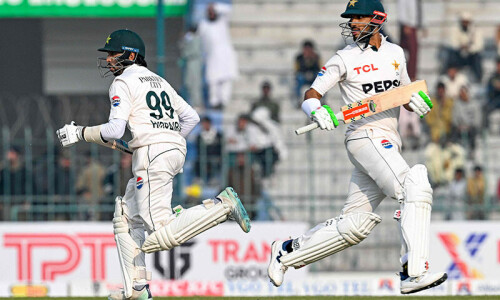

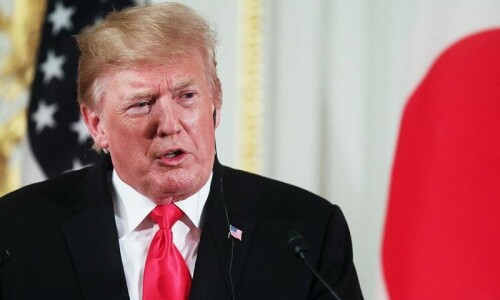


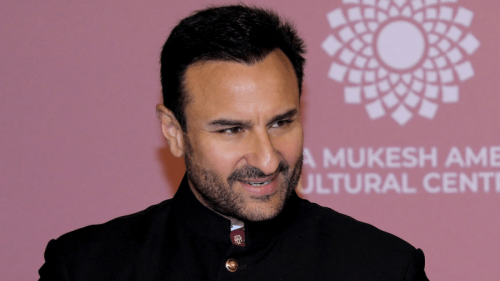












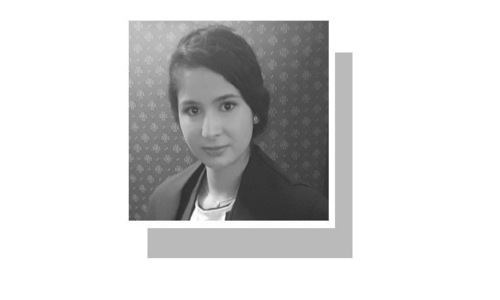
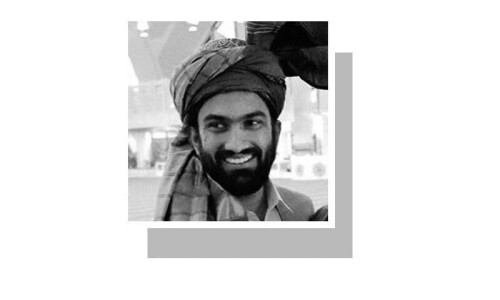

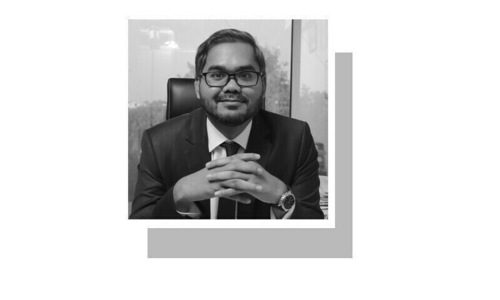



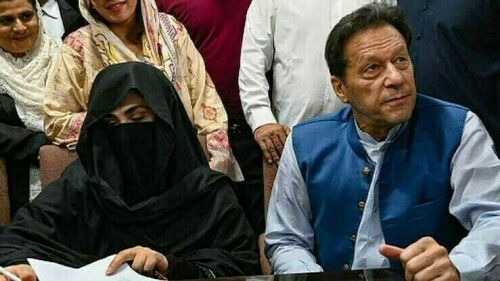

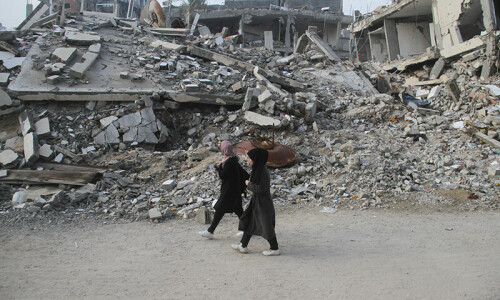



Dear visitor, the comments section is undergoing an overhaul and will return soon.